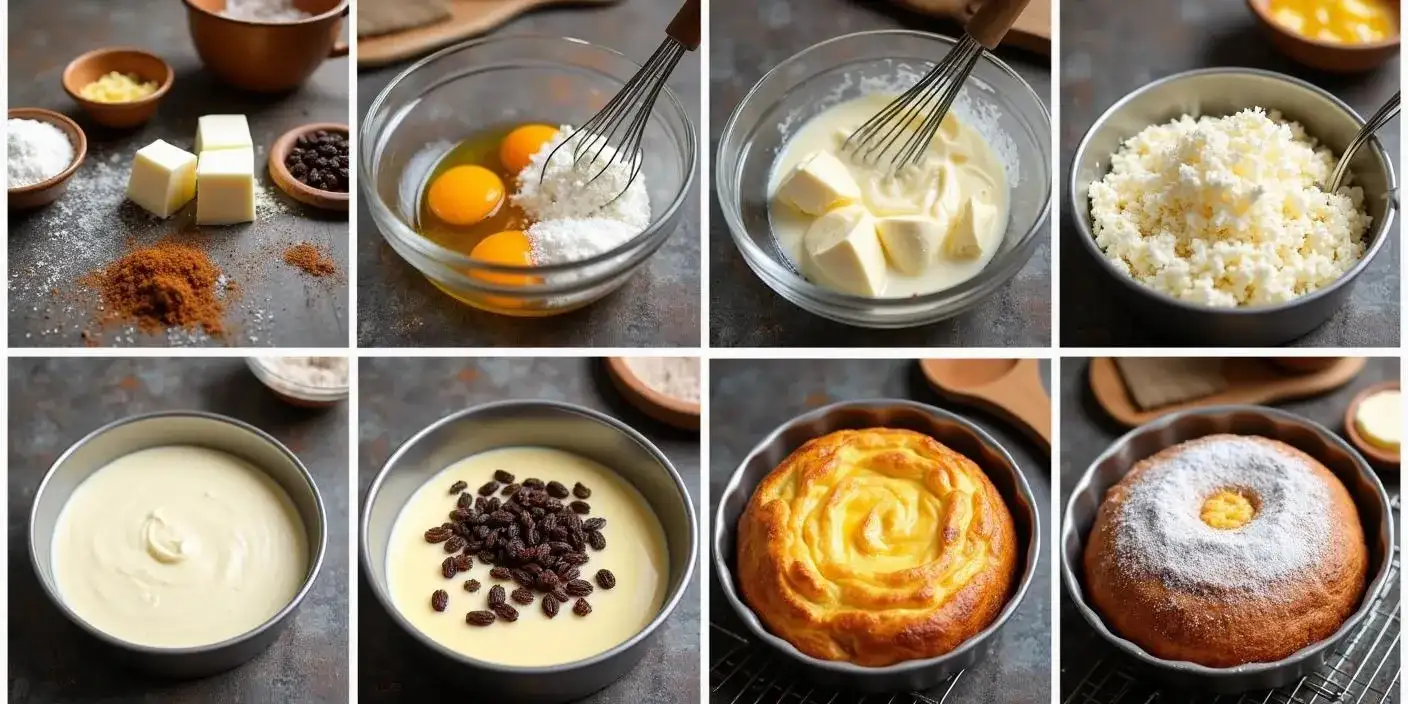An easy and delicious Romanian Easter dessert made with cottage cheese, eggs, sour cream, and raisins—without the traditional dough. This lighter version of Pasca tastes just like the classic, but is simpler and quicker to prepare. A must-have for your Easter table!
Ingredients
- 500 g cottage cheese, well-drained
- 300 ml sour cream (high fat content)
- 100 g sugar (adjust to taste)
- 75 g butter, very soft
- 4 eggs
- 50 g flour
- 1 tbsp vanilla essence
- 100 g raisins (optional)
- Semolina (for dusting the baking tin)
- Butter (for greasing the tin)
Instructions
- Remove all ingredients from the fridge and bring to room temperature.
- If needed, drain the cottage cheese overnight in a cheesecloth.
- Preheat oven to 180°C (350°F).
- In a large bowl, whisk together the eggs, sugar, and vanilla essence until creamy.
- Add the cottage cheese and mix until smooth.
- Stir in the soft butter until fully incorporated.
- Mix in the flour, then fold in the sour cream.
- Add the raisins and stir to distribute evenly.
- Grease a baking tin with butter and dust with semolina.
- Pour the mixture into the prepared tin and level the top.
- Bake for about 40 minutes, or until the edges are golden and a toothpick inserted in the center comes out clean.
- Allow to cool in the tin for a couple of hours, then refrigerate.
- Serve cold, dusted with powdered sugar.
Notes
 Romanian Pasca is a beloved Easter dessert that holds a deep cultural and religious significance in Romania. It’s traditionally made with a sweet cheese filling and often surrounded by a rich, fluffy dough similar to cozonac. However, in many modern families, a simplified and lighter version has become just as popular—and just as delicious!
This article introduces readers to a quick and easy version of the traditional Pasca, made without dough, but with all the flavor and warmth of Easter celebrations. It's a wonderful addition to any festive table, whether you're celebrating Romanian-style or just looking for a unique and beautiful dessert.
Romanian Pasca is a beloved Easter dessert that holds a deep cultural and religious significance in Romania. It’s traditionally made with a sweet cheese filling and often surrounded by a rich, fluffy dough similar to cozonac. However, in many modern families, a simplified and lighter version has become just as popular—and just as delicious!
This article introduces readers to a quick and easy version of the traditional Pasca, made without dough, but with all the flavor and warmth of Easter celebrations. It's a wonderful addition to any festive table, whether you're celebrating Romanian-style or just looking for a unique and beautiful dessert.
🐰 The Story Behind the Romanian Pasca
For one Romanian family, Pasca wasn’t always part of the Easter table. The tradition began later, when the mother decided to try her hand at the classic version one year—and it became an instant hit. Since then, Pasca has become a staple of their Easter menu. Over the years, the original recipe evolved. While the traditional Pasca is encased in cozonac dough, this version skips the dough altogether, making the dessert feel lighter and easier to prepare—perfect for modern kitchens. Plus, cozonac is always served separately at Romanian Easter dinners, so there's little need to double up.🕊️ A Romanian Easter Tradition Rooted in Faith
In Romania, Easter is one of the most cherished holidays, and many customs are rooted in deep religious beliefs. Pasca is no exception. It is typically prepared on Holy Saturday and brought to church in a basket, alongside red-dyed eggs, to be blessed during the Easter Vigil. In rural areas, Pasca often becomes the first food consumed after Lent, shared with family and friends after the midnight resurrection service. It's a spiritual and symbolic gesture, celebrating rebirth, tradition, and community.🧀 What Is Pasca?
Traditional Pasca is made using sweet cozonac dough as a base and border, filled with a creamy mixture of fresh farmer’s cheese, eggs, sugar, and often raisins. The top is usually adorned with a dough cross, symbolizing Christ's resurrection. The doughless version of Pasca shared here is simpler and lighter, more like a baked cheesecake. It’s just as flavorful, but much easier to make—and perfect for busy cooks.👩🍳 Pro Tips for the Perfect Pasca
- Choose the right cheese: Romanian or Turkish cottage cheese is drier and ideal for baking. Avoid overly wet or creamy versions.
- Drain overnight: If your cottage cheese contains liquid, don’t skip this step—it makes a big difference in texture!
- Room temperature ingredients: Especially the butter—it needs to be soft to blend well.
- Baking pan safety: If using a springform or easy-release tin, place it on a baking sheet to prevent spills.
- Don’t worry about browning: It’s perfectly normal for Pasca to brown more on the edges.
❄️ Storage & Shelf Life
🧊 How to Store Romanian Pasca:
Store the Pasca in the refrigerator, covered with foil or an airtight lid.⏳ How Long Does It Last?
Pasca keeps beautifully for up to 1 week in the fridge—though it rarely lasts that long, because it’s so irresistible! 😉✨ Final Thoughts
Whether you're preparing for your first Romanian Easter or simply want to bring something new to your holiday table, this easy Romanian Pasca recipe offers a taste of tradition with modern convenience. It’s creamy, slightly sweet, full of heritage, and perfect for celebrating spring and renewal. 🌼💒💬 FAQ
Q: Can I make this in advance?Yes! In fact, it tastes even better after resting overnight in the fridge. Q: Can I skip the raisins?
Absolutely. Pasca is very flexible—add lemon zest, chocolate chips, or keep it plain. Q: Is Pasca the same as cheesecake?
Not exactly—while it resembles a baked cheesecake, Pasca is unique due to its use of cottage cheese and cultural significance.